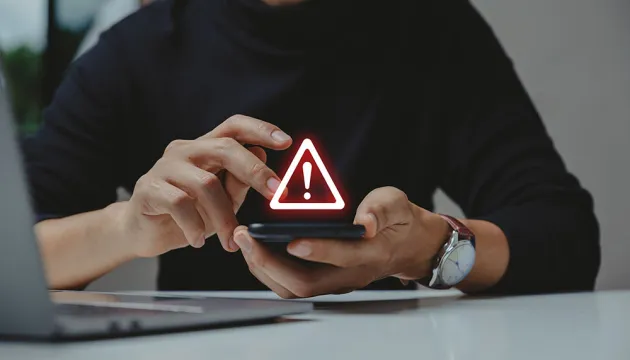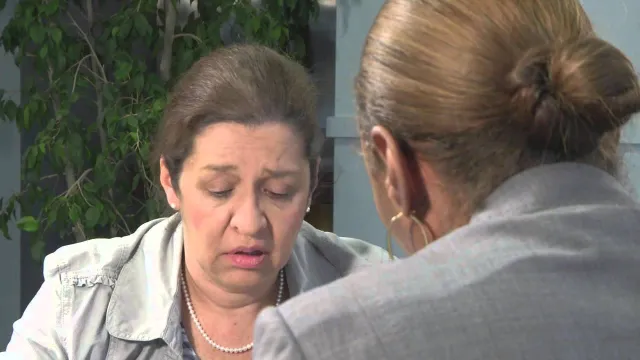What are Frauds and Scams?
Fraud involves acquiring information through dishonest methods without you knowing. A scam attempts to trick you into willingly providing money or personal information. Scams normally rely on you willingly sharing your information, because you are misled by the scammer. Imposter scams are the most common, followed by online shopping scams; prizes, sweepstakes, and lotteries; Investment scams; and business and job opportunities scams. Learn about different types of fraud, scams, and cybercrimes and how you can avoid them.

Common Types of Scams
Imposter Scams
Imposters pretend to be someone you know, like a family member or a friend, a representative from a government agency like the NCUA, IRS, or Social Security Administration, a tech support company, or a company you do business with. It may even be someone trying to manipulate you into believing that you have a romantic or close relationship with them. They make plans to meet in person, but it never happens because they often claim to be working outside the country. They ask you for money for emergencies or trick you into providing your sensitive information. Imposters try to make you trust them in order to steal your personal information or ask you to buy a gift card, send digital currency, or transfer money. Government agencies, including the NCUA, do not ask for money or your personal and financial information. When unsure whether they are who they say they are, DO NOT send money or share your information. Instead, terminate the communication and call the organization to authenticate the communication.
Online Shopping Scams
Scammers develop fake websites mimicking popular retailers’ sites and take your money and payment information without delivering products. They also create counterfeit apps containing malware (malicious software) for the same reasons.
Be sure to read refund and return policies prior to making a purchase. If your order didn’t arrive or your refund request is denied, dispute the charges. Using a credit card for online purchases can make the dispute process much easier. Watch out for bogus websites and suspicious apps and only use official retailer websites and apps, which may offer stronger security. Also, monitor your credit and debit card transactions on a regular basis to increase the chance of spotting unauthorized purchases or withdrawals in the early stage of this fraud.
Investment Fraud
There are various types of investment fraud, including Ponzi schemes and pyramid scams. A Ponzi scheme is a fraudulent investment scam that pays earnings to earlier investors with money from new investors – similar to a pyramid scam. In many cases, scammers promise high investment returns without making an actual investment. Though they are called by different names, most investment scams share the same characteristics, such as guaranteed high returns with no risk and high-pressure sales tactics. Be on guard. Fraudsters often avoid putting the details about the investment in writing or call them confidential. If this is the case for you, consult with fiduciary financial advisors or just walk away. DO NOT rush into an investment opportunity without your own independent research. Talking with people you trust can help you see the offer more clearly.
Fake Check Scams
Despite many variations, fake check scams involve two main components: 1) scammers send cashier’s checks or money orders to you; and 2) they ask you to send part of the cashed money back to them in gift cards, money orders, or cryptocurrency. If you deposit the checks and they are later found to be fraudulent, you will likely be required to pay the deposited funds back to your credit union or bank. Be on guard. Cashier’s checks are not cash, and it can take weeks to validate legitimacy. If the amount on the check is more than what it should be, void it and ask the sender to resend another check for the correct amount. Do not wire or send gift cards, money orders, or cryptocurrency. Your money is not protected in these transactions.
Prizes, Sweepstakes, and Lotteries
Scammers may contact you claiming you won a prize, sweepstake, or lottery and then ask for money or your account information to cover taxes and other fees upfront. They might pretend to be from government agencies or claim you’ve won a foreign lottery, which is almost certainly a scam.
Remember, government agencies do not call to demand money or your financial information to collect a prize. Also, real sweepstakes are free and by chance. If you did not enter a lottery or sweepstakes or are unsure about the call, message, email, or letter, DO NOT send money or share your information.
Business and Job Opportunity Scams
Job and business opportunities that sound too good to be true, often are. If the message promotes doing minimal work with a high salary, pledging guaranteed income, or a proven business operation system, it is likely a scam.
Take your time and get a second opinion or talk to someone who has your best interests in mind. Before accepting a job offer, know that honest employers, including the federal government, will not ask for payment for the promise of a job. Before paying for a business opportunity, research the seller, the company, and the coach’s credentials, and ask for the legally required 1-page disclosure document that tells any lawsuits against the seller, a cancellation or refund policy, and other information.
Disaster Fraud
Disaster fraud typically involves others trying to take advantage of the situation and examples include fake government employees and bogus charities. Fraudsters approach when you are vulnerable and in crisis to exploit your money and financial information while pretending to help with recovery.
No FEMA, federal, or state workers will ask for or accept money from you when applying for disaster assistance. If someone wearing a FEMA jacket or shirt without an I.D., approaches, do not trust or offer any personal information and always ask to see an official I.D. Take your time and contact government agencies or local law enforcement to confirm identity and legitimacy of suspicious contacts.
Check Washing
Check washing scams involve changing the payee names and often the dollar amounts on checks and fraudulently depositing them. Occasionally, these checks are stolen from mailboxes and washed in chemicals to remove the ink.
Retrieve your mail regularly instead of leaving it in your mailbox. Deposit your outgoing mail at your local Post Office or in blue collection boxes before the last pickup. If you’re going on vacation, have your mail held at the Post Office or have it picked up by a friend or neighbor each day.
Targeting Seniors
Financial crimes are often targeted at our growing older population more frequently and are all too often successful. Older citizens are most likely to have a “nest egg,” own their home, and have excellent credit—all of which make them attractive to con artists.
Common Scams Aimed at Seniors
Understanding and identifying elder financial exploitation can help you protect yourself, your loved ones, or someone you care for who may be at risk for this kind of abuse. Scammers may use information that seniors may need such as health care, reverse mortgages, funeral planning, and investments. Older adults are less likely to report a fraud because they don’t know who to report it to, are too ashamed or don’t know they have been scammed. Elderly victims may not report crimes, for example, because they are concerned that relatives may think the victims no longer have the mental capacity to take care of their own financial affairs.

What to do if You Have Been Scammed?
Scammers are skilled at manipulating people and can be very convincing. They call, email, and send us text messages trying to get our money or sensitive personal information — like your Social Security or account numbers. If you paid someone you think is a scammer or gave them your personal information or access to your computer or phone, your money might be gone already. No matter how you paid, it’s always worth asking the company you used to send the money if there’s a way to get it back.
Where to Report Frauds & Scams
- Report anything you think may be a fraud, scam, or bad business practice to the Federal Trade Commission (FTC).
- Report unwanted calls from telemarketers and register your number on the national Do Not Call Registry via the FTC.
- Report a suspected investment fraud or a problem with your investments to the SEC or report a potentially fraudulent, illegal, or unethical investment activity to FINRA.
- Report a suspected financial/economic crime or fraud to the FBI (e.g., mortgage fraud or investment fraud).
Frequently Asked Questions
Common Credit Counseling Scams include the following.
- Upfront Fees – Scammers often demand large upfront fees before providing any services. Legitimate credit counseling agencies typically do not charge significant fees upfront.
- Overpromising – Fraudulent companies may promise to erase accurate negative information from your credit report, which is not legally possible.
- Lack of Transparency – Scammers may not explain your rights or the details of their services clearly. They may push their own programs without considering your specific needs.
- Complex Contracts – Contracts that are difficult to understand or filled with legal jargon can be a red flag. Legitimate services should provide clear and straightforward agreements.
Common debt relief scams include the following.
- Guaranteed Debt Elimination – Scammers may guarantee complete debt elimination, which is unrealistic. No company can guarantee that creditors will agree to settle for less than what you owe.
- Upfront Fees – Similar to credit counseling scams, debt relief scams often require significant upfront fees before any services are rendered.
- High-Pressure Tactics – Scammer may use high pressure sales tactics to rush you into signing up for their services without giving you time to consider your options.
- False Claims – Some scammers falsely claim they can negotiate with creditors to reduce your debt significantly, but they either do nothing or provide minimal assistance with charging high fees.
If you are asked to provide financial information, it may be a scam. Exercise caution with any phone calls, text messages, or emails that claim to be from your credit union, law enforcement, or your phone service provider, especially if they ask for personal or financial information or prompt you to transfer money to a different account. Legitimate credit unions and other institutions will never solicit such details or request these kinds of transfers from you. If you receive such a call, note the department they claim to be from and return the call using the number you have for your credit union on file. Be aware that scammers might supply a number that connects you to another scammer impersonating a credit union employee.
Using your phone for online banking raises several security concerns.
- Phishing – Cybercriminals may send emails or texts that seem to come from a trustworthy source, but their true goal is to deceive you into clicking on a harmful link or providing personal details.
- Insecure data storage – Some apps may save sensitive information such as login credentials and transaction records on your device. If this data is not properly encrypted, it could be accessed by malicious individuals.
- App vulnerabilities – Although mobile banking apps are typically safer than using a web browser, some developers might not adequately address the risks of fraud and money laundering during the development process.
- Coding errors – Errors in coding can introduce vulnerabilities that disrupt an app's functionality, potentially leading to unintended issues.
Consider installing a virus scanning tool on your phone and computer. Ultimately, it's important not to save your online passwords on your phone. Additionally, consider implementing multiple layers of identification, such as using a password along with having the credit union send you a PIN via text.
If you experience property damage due to a disaster, you should contact your insurance company as soon as possible to verify that you have coverage and start the claims process. This will probably involve you taking an inventory of damaged property and providing the insurance company with available photos or video to prove the validity of your claim. Contact your creditors including mortgage servicer and utility companies to see what options are available to reduce or delay payments, prevent foreclosure, loss of service and derogatory credit reporting. Disaster survivors can also contact the Federal Emergency Management Agency (FEMA) to apply for assistance at 800-621-3362 or their website at FEMA.GOV.
Unfortunately, it’s common for scammers to prey on victims of disasters because victims are extremely vulnerable and sometimes desperate to receive assistance. Some examples of this include:
- Contractor Fraud – Unethical contractors sometimes misrepresenting themselves as being affiliated with government entities will scam victims out of funds resulting in shoddy repairs or no repairs at all.
- Price Gouging – The practice of increasing prices of high demand goods and services during a disaster.
- Forgery – Scammers will use a disaster as an opportunity to get access to victims’ personal information and documents to commit identity theft.
- Charity Fraud – Scammers posing as representatives from notable charities including the Red Cross will solicit funds from donors who want to help those affected.
If you are a victim of a scam, you can contact the National Center for Disaster Fraud (NCDF) 24 hours a day. 7 days a week through their hotline number 866-720-5721.
